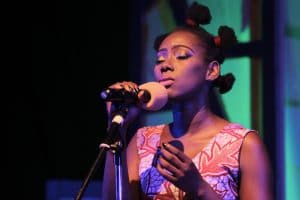Poetra Ama Asantewa Diaka is as a young and combative Ghanaian artist, living between the African country and the US. She doesn’t want to be boxed into the definition of “poet” or “writer” – she rather describes herself as a “storyteller“, since the term “encompasses all the ways she can tell a story” – as she explains.

Poetra’s approach to the world of poetry didn’t start suddenly, nor triggered by any specific event, but grew bigger and bigger thanks to the collaboration, in 2010, with a community of poets and writers who used to meet bimonthly to slam, perform and occasionally have conversations. This interaction led her “to slowly transform an inner frustration into performance poetry“. With her verses, Poetra crafts lessons of self-love and self-exploration: “My writing is a documentary of self, and the ecosystem in which I live in. My work is influenced by my experiences, the experience of others, my community, near and far. I use my writing to investigate, document, query and find answers. And I believe this heavily impacts on my life and the lives of those who interact with my work, even if it is to oppose”, she discloses to AfroWomenPoetry.
Mental illness and body perception stand out as her favourite topics to share with her readers, with the Ghanaian youth and with the African community:”It is prevalent in my work because I’m trying to initiate conversation, or highlight theme, or vent or document, ask questions or propose solutions“. All her verses are framed in a fair dose of feminism, intended as “refusing to confine [oneself] within the lines of society’s definition of who, what and how [one] should be simply because of [their own] gender“.
Her work is not only about producing pleasant and melodious compositions – she often combines spoken words accompanied by original soundtracks – rather, it’s a mission: “I aim to use my writing to analyze things from different perspectives, to view things in slow motion, to question things more, to appreciate things more, to observe things closely, to explore and to create an atmosphere to look at things more critically.”
Poetra has interacted with few of her foreign fellow artists, both within and outside Ghana. As far as she is concerned, the collaboration between the artists’ communities is “fairly healthy, mainly inadequate“. She complains about the lack of programs and events for inter-creating, plus “there are lots of foreign residencies or programs which allows for very few artists to travel and interact with foreign artists. There are very few – or close to none such programs happening or organized for artists within the country.”
Link to the Italian version of the interview
****
Read Hungry, a spoken word poem centered on the relationship between African youth and their respective countries or systems. It was born out of an observation of a lot of the youth migrating to other parts of the world – because of a lack of sustainability and growth at home.”
Read For the blues, a poem that tries to make sense of a young woman’s anxiety and inadequacy feelings instilled by society and politics, so inclined to crush new generations.
Read In Which I Tell You All The Reasons I Don’t Want to Exist And You Tell Me to Remember, poem originally composed for “Parole in folle” – final event of One Global Voice, a project about mental health promoted by Voci Globali.
Saw the story on the use of bleaching creams that darker skinned women are using. Love the message and sistah’s across the diaspora need to hear your message